19 apr 2016
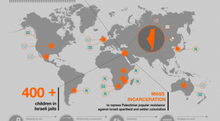
The United Nations Office for Project Services (UNOPS) in Jordan has not renewed its contract with security company G4S, following a campaign over the firm’s role in Israeli human rights abuses, the BDS national movement has reported.
The UNOPS in Jordan contract with G4S was worth more than $50,000 in 2014 but UNOPS has now hired a new security service provider to provide security services at its Amman office.
In light of the ongoing #UNDropG4S campaign, the Jordan branches of UNHCR and UNICEF both recently distanced themselves from G4S.
G4S has a contract with the Israeli Prison Service to provide services and equipment to prisons where Palestinians are held without trial and subjected to torture.
It also helps Israel run checkpoints, security at illegal settlements and a training centre for Israeli police who control and oppress Palestinians living in annexed East Jerusalem.
Backed by hundreds of organisations from across the world, the #UNdropG4S campaign is urging the UN to drop all of its contracts with G4S. UN’s data shows spent more than $22 million on services provided by G4S in 2014.
With the BDS campaign costing it contracts worth millions of dollars, G4S recently announced that it wanted to sell its Israeli business, but is still yet to do so.
Guman Mussa, Arab world coordinator with the Palestinian BDS National Committee, the coalition of Palestinian organisations that works to guide and supports the BDS movement, said:
“It’s significant that UN agencies appear to be recognising that having contracts with firms that help Israel to oppress Palestinians like G4S contradicts the UN’s principles. We urge Ban Ki-moon to ban G4S from being awarded any further UN contracts.”
“This year’s Palestinian political prisoners day came as Israel intensifies its use of mass incarceration as a way of deterring Palestinians from resisting its regime of occupation, settler colonialism and apartheid. G4S continues to profit from Israel’s checkpoints, use of torture and mass incarceration.”
“The fact that G4S has announced it wants to sell its Israeli business shows that our campaign is having a huge impact. But the company has a track record of saying one thing and doing another so we have to keep the pressure up until they actually end their complicity in Israel’s human rights abuses.”
“The continued growth of of the G4S campaign in the Arab world and in Latin America will be particularly concerning to G4S as the company has identified both regions as important growth areas in its strategy. G4S’ revenue in Arab countries five times higher than its revenue in Israel.”
Shahd Al-Hamouri, member of the Jordan BDS movement, welcomed the news:
“This is another positive step but we urge the UN and specifically in Jordan the UNDP, World Food Program and UN Women to follow suit. All UN agencies must end their contracts with G4S due to its continued violation of international law and the UN Guiding Principles on Business and Human Rights.”
There are now more than 7,000 Palestinians in Israeli jails including 400 children and 670 people held in administrative detention, a form of detention without trial.
G4S recently announced, according to the PNN, that it wanted to sell its Israeli business but is still yet to do so. The company has broken its previous pledges to end its involvement in Israeli crimes.
The international campaign against G4S has persuaded the Jordan branches of Unicef and UNHCR, universities, charities and banks to cancel their contract with G4S, costing the company millions of dollars. In 2014, the Bill Gates Foundation sold its shares in G4S following a public campaign.
In April 2012, G4S issued a statement pledging that by 2015 it would exit a number of contracts which involved the servicing of Israeli security equipment at the Wall checkpoints, a prison and a police station in the occupied West Bank. It has failed to implement this commitment.
In June 2014, G4S told shareholders that it “did not intend” to renew its contract with the Israel Prison Service when it expired during 2017.
According to research group Who Profits, G4S continues to have contracts with the Israeli Prison Service.
The UNOPS in Jordan contract with G4S was worth more than $50,000 in 2014 but UNOPS has now hired a new security service provider to provide security services at its Amman office.
In light of the ongoing #UNDropG4S campaign, the Jordan branches of UNHCR and UNICEF both recently distanced themselves from G4S.
G4S has a contract with the Israeli Prison Service to provide services and equipment to prisons where Palestinians are held without trial and subjected to torture.
It also helps Israel run checkpoints, security at illegal settlements and a training centre for Israeli police who control and oppress Palestinians living in annexed East Jerusalem.
Backed by hundreds of organisations from across the world, the #UNdropG4S campaign is urging the UN to drop all of its contracts with G4S. UN’s data shows spent more than $22 million on services provided by G4S in 2014.
With the BDS campaign costing it contracts worth millions of dollars, G4S recently announced that it wanted to sell its Israeli business, but is still yet to do so.
Guman Mussa, Arab world coordinator with the Palestinian BDS National Committee, the coalition of Palestinian organisations that works to guide and supports the BDS movement, said:
“It’s significant that UN agencies appear to be recognising that having contracts with firms that help Israel to oppress Palestinians like G4S contradicts the UN’s principles. We urge Ban Ki-moon to ban G4S from being awarded any further UN contracts.”
“This year’s Palestinian political prisoners day came as Israel intensifies its use of mass incarceration as a way of deterring Palestinians from resisting its regime of occupation, settler colonialism and apartheid. G4S continues to profit from Israel’s checkpoints, use of torture and mass incarceration.”
“The fact that G4S has announced it wants to sell its Israeli business shows that our campaign is having a huge impact. But the company has a track record of saying one thing and doing another so we have to keep the pressure up until they actually end their complicity in Israel’s human rights abuses.”
“The continued growth of of the G4S campaign in the Arab world and in Latin America will be particularly concerning to G4S as the company has identified both regions as important growth areas in its strategy. G4S’ revenue in Arab countries five times higher than its revenue in Israel.”
Shahd Al-Hamouri, member of the Jordan BDS movement, welcomed the news:
“This is another positive step but we urge the UN and specifically in Jordan the UNDP, World Food Program and UN Women to follow suit. All UN agencies must end their contracts with G4S due to its continued violation of international law and the UN Guiding Principles on Business and Human Rights.”
There are now more than 7,000 Palestinians in Israeli jails including 400 children and 670 people held in administrative detention, a form of detention without trial.
G4S recently announced, according to the PNN, that it wanted to sell its Israeli business but is still yet to do so. The company has broken its previous pledges to end its involvement in Israeli crimes.
The international campaign against G4S has persuaded the Jordan branches of Unicef and UNHCR, universities, charities and banks to cancel their contract with G4S, costing the company millions of dollars. In 2014, the Bill Gates Foundation sold its shares in G4S following a public campaign.
In April 2012, G4S issued a statement pledging that by 2015 it would exit a number of contracts which involved the servicing of Israeli security equipment at the Wall checkpoints, a prison and a police station in the occupied West Bank. It has failed to implement this commitment.
In June 2014, G4S told shareholders that it “did not intend” to renew its contract with the Israel Prison Service when it expired during 2017.
According to research group Who Profits, G4S continues to have contracts with the Israeli Prison Service.
16 apr 2016

The Spanish municipality of Montoro declared that it joined the Boycott, Divestment and Sanctions (BDS) movement against Israel for “its discrimination policies and lack of commitment to international laws.”
The decision came after the municipal council has recently passed a motion supporting a boycott against Israel.
The municipal council reviewed during its session the reasons for adopting the BDS campaign. The council highlighted the international laws and United Nations resolutions that Israel has not implemented.
It also mentioned the illegality of the settlements and the Separation Wall, in addition to the issue of refugees, Israel’s demolition and arrest policies, and the suffering of the residents of the Gaza Strip.
The municipality called on other Spanish cities to take the same action and to boycott Israel at all levels until it withdraws from the occupied territories and respects the international law and the rights of the Palestinian people to independence and freedom.
This move comes in light of similar decisions to boycott Israeli which were made by other Spanish institutions, the most recent being the University of Barcelona.
The decision came after the municipal council has recently passed a motion supporting a boycott against Israel.
The municipal council reviewed during its session the reasons for adopting the BDS campaign. The council highlighted the international laws and United Nations resolutions that Israel has not implemented.
It also mentioned the illegality of the settlements and the Separation Wall, in addition to the issue of refugees, Israel’s demolition and arrest policies, and the suffering of the residents of the Gaza Strip.
The municipality called on other Spanish cities to take the same action and to boycott Israel at all levels until it withdraws from the occupied territories and respects the international law and the rights of the Palestinian people to independence and freedom.
This move comes in light of similar decisions to boycott Israeli which were made by other Spanish institutions, the most recent being the University of Barcelona.
12 apr 2016

Activists called for a boycott campaign against Dutch international courier company TNT Express after its staff reportedly refused to deliver parcels to Palestinian recipients, allegations the company denied.
Boycott campaign co-organizer Suhaib Zahdah told Ma’an on Monday that “the issue surfaced after TNT employees refused to deliver mail parcels to their Palestinian recipients.”
The recipients contacted the company, which reportedly said company policy doesn’t allow work with the Palestinians, and suggested the recipients “use addresses in Jerusalem or Nazareth [in Israel] instead,” Zahdah said, referring to the reply of TNT’s headquarters in the Netherlands as “negative.”
“This is a violation of international law as the company discriminates by employing people refusing to work with Palestinians while they work with the illegal Israeli settlements,” he said.
The boycott campaign was launched under the slogan “TNT, the people discrimination,” a play on the company’s slogan “the people network.”
In response to the allegations, the company told Ma’an that TNT makes regular deliveries to Palestine, “including Ramallah, Gaza, East Jerusalem, Hebron, and the West Bank.”
While the company said TNT’s Israel branch “delivers shipments to Israeli towns, including those in the West Bank,” referring to Israeli settlements, shipments to Palestinians in the occupied Palestinian territory are handled through TNT’s Jordan branch, and delivered by a subcontractor once “for the final delivery.”
TNT in response to the case brought up by the campaign said: “We've had email exchanges with a customer who was disappointed because TNT Israel wasn't able to make a delivery at the address he specified.”
“Security restrictions may at times limit our ability to serve certain destinations or addresses. This is what we explained to one of our customers today,” TNT said, emphasizing the company did not have a political agenda.
The boycott, divestment, and sanctions (BDS) movement against Israel has gained momentum over the past year, with activists increasingly targeting companies that act in compliance with Israel’s illegal occupation of East Jerusalem and the West Bank.
Israeli settlements in East Jerusalem and the West Bank are considered illegal by the majority of the international community, and companies who either operate out of settlements or in cooperation with settlement-based companies are seen by the BDS movement as supporting illegal Israeli policies.
Boycott campaign co-organizer Suhaib Zahdah told Ma’an on Monday that “the issue surfaced after TNT employees refused to deliver mail parcels to their Palestinian recipients.”
The recipients contacted the company, which reportedly said company policy doesn’t allow work with the Palestinians, and suggested the recipients “use addresses in Jerusalem or Nazareth [in Israel] instead,” Zahdah said, referring to the reply of TNT’s headquarters in the Netherlands as “negative.”
“This is a violation of international law as the company discriminates by employing people refusing to work with Palestinians while they work with the illegal Israeli settlements,” he said.
The boycott campaign was launched under the slogan “TNT, the people discrimination,” a play on the company’s slogan “the people network.”
In response to the allegations, the company told Ma’an that TNT makes regular deliveries to Palestine, “including Ramallah, Gaza, East Jerusalem, Hebron, and the West Bank.”
While the company said TNT’s Israel branch “delivers shipments to Israeli towns, including those in the West Bank,” referring to Israeli settlements, shipments to Palestinians in the occupied Palestinian territory are handled through TNT’s Jordan branch, and delivered by a subcontractor once “for the final delivery.”
TNT in response to the case brought up by the campaign said: “We've had email exchanges with a customer who was disappointed because TNT Israel wasn't able to make a delivery at the address he specified.”
“Security restrictions may at times limit our ability to serve certain destinations or addresses. This is what we explained to one of our customers today,” TNT said, emphasizing the company did not have a political agenda.
The boycott, divestment, and sanctions (BDS) movement against Israel has gained momentum over the past year, with activists increasingly targeting companies that act in compliance with Israel’s illegal occupation of East Jerusalem and the West Bank.
Israeli settlements in East Jerusalem and the West Bank are considered illegal by the majority of the international community, and companies who either operate out of settlements or in cooperation with settlement-based companies are seen by the BDS movement as supporting illegal Israeli policies.
11 apr 2016
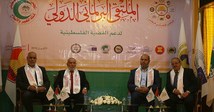
Palestinian, Arab and European MPs stressed on Sunday the importance of the Palestinian people’s right of self-determination and self-defense. During the Inter-Parliamentary Forum to support the Palestinian cause held in Gaza Strip, the MPs stressed the urgent need for the release of Palestinian MPs held illegally in Israeli jails and for the return of the exiled MPs.
The forum was organized by the Palestinian Legislative Council (PLC) in Gaza City with the participation of representatives of the Palestinian parliamentary blocs along with Arab and European MPs.
The MPs called for breaking Gaza siege as it causes a catastrophic humanitarian situation, calling on the Egyptian authorities to reopen Rafah crossing which has been closed for more than 500 days.
During the forum, the deputy head of Hamas’s political bureau MP Ismail Haneyya said that such forums stress that the Palestinian cause is a central issue. Haneyya expressed hope that the PLC will soon held a session with all its parliamentary blocs in Gaza and West Bank. Head of Hamas’s parliamentary bloc Khalil al-Hayya, for his part, stressed the need for activating the PLC’s parliamentary role.
He said that his group is keen to achieve the Palestinian national unity and reconciliation, calling for supporting the ongoing Jerusalem Intifada. In his turn, first deputy head of the PLC Dr. Ahmed Baher said that “the forum coincides with the anniversary of Deir Yassin massacre that represents evidence of the Israeli bloody mentality.”
Baher called on Turkish President Recep Tayyip Erdogan and the Saudi King Salman bin Abdul Aziz to take practical decisions in support of Palestinian cause. The leader in Fatah Movement Faisal Abu Shahla revealed during the event that there is an Israeli plan to deepen the gap between West Bank and Gaza and to continue the unfair siege on the Strip. He called for ending the internal division and to reform a new unity government prior the presidency and legislative elections.
He also called on the international community to stop its double-standard policy with Israel as a state above the law and to freeze the Israeli Knesset membership in the international parliament until the release of all Palestinian detained MPs. The second deputy head of the PLC Hassan Khreisheh detailed in his speech the Israeli violations against Palestinian people in West Bank.
There are more than half a million Israeli settlers living in 200 settlements in the West Bank and more and 600 military checkpoints set up throughout its towns and cities, he pointed out. The exiled Jerusalemite MP Ahmed Attoun called for activating Jerusalem and al-Aqsa Mosque issue at international forums and meetings, calling for supporting the Jerusalemite steadfastness.
Meanwhile, first deputy head of the Arab Parliament Samiya Ahmed said that contacts have been made to support the Palestinian cause and people. The Arab Parliament has made numerous contacts with regional and international parties to end the siege on Gaza and to achieve a decent life for the Palestinians, she underlined. Head of the World Forum for Islamist Parliamentarians Nasser al-Sana’a hailed, for his part, the Palestinian steadfastness and called for activating the Palestinian cause.
Deputy Chairman of the Tunisian Parliament Abdel Fattah Moro strongly condemned the continued siege on Gaza, saying that the Palestinian cause is a humanitarian issue. On the other hand, member of the European Parliament Jill Evans expressed in her letter to the forum her wish to visit Palestine and Gaza Strip in particular in the coming period. She pointed out that there is an increasing solidarity movement with the Palestinian cause within the European society.
For his part, member of European Parliament Bart Staes stressed that the EU is pressuring the Israeli occupation through the European Council of Foreign Ministers. Member of the Irish Parliament Richard Buebaras expressed his country’s total support for the Palestinian cause and people. Member of the British House of Commons Jenny Tong pointed out that the BDS movement against Israel has achieved a wide support in Britain.
The forum was organized by the Palestinian Legislative Council (PLC) in Gaza City with the participation of representatives of the Palestinian parliamentary blocs along with Arab and European MPs.
The MPs called for breaking Gaza siege as it causes a catastrophic humanitarian situation, calling on the Egyptian authorities to reopen Rafah crossing which has been closed for more than 500 days.
During the forum, the deputy head of Hamas’s political bureau MP Ismail Haneyya said that such forums stress that the Palestinian cause is a central issue. Haneyya expressed hope that the PLC will soon held a session with all its parliamentary blocs in Gaza and West Bank. Head of Hamas’s parliamentary bloc Khalil al-Hayya, for his part, stressed the need for activating the PLC’s parliamentary role.
He said that his group is keen to achieve the Palestinian national unity and reconciliation, calling for supporting the ongoing Jerusalem Intifada. In his turn, first deputy head of the PLC Dr. Ahmed Baher said that “the forum coincides with the anniversary of Deir Yassin massacre that represents evidence of the Israeli bloody mentality.”
Baher called on Turkish President Recep Tayyip Erdogan and the Saudi King Salman bin Abdul Aziz to take practical decisions in support of Palestinian cause. The leader in Fatah Movement Faisal Abu Shahla revealed during the event that there is an Israeli plan to deepen the gap between West Bank and Gaza and to continue the unfair siege on the Strip. He called for ending the internal division and to reform a new unity government prior the presidency and legislative elections.
He also called on the international community to stop its double-standard policy with Israel as a state above the law and to freeze the Israeli Knesset membership in the international parliament until the release of all Palestinian detained MPs. The second deputy head of the PLC Hassan Khreisheh detailed in his speech the Israeli violations against Palestinian people in West Bank.
There are more than half a million Israeli settlers living in 200 settlements in the West Bank and more and 600 military checkpoints set up throughout its towns and cities, he pointed out. The exiled Jerusalemite MP Ahmed Attoun called for activating Jerusalem and al-Aqsa Mosque issue at international forums and meetings, calling for supporting the Jerusalemite steadfastness.
Meanwhile, first deputy head of the Arab Parliament Samiya Ahmed said that contacts have been made to support the Palestinian cause and people. The Arab Parliament has made numerous contacts with regional and international parties to end the siege on Gaza and to achieve a decent life for the Palestinians, she underlined. Head of the World Forum for Islamist Parliamentarians Nasser al-Sana’a hailed, for his part, the Palestinian steadfastness and called for activating the Palestinian cause.
Deputy Chairman of the Tunisian Parliament Abdel Fattah Moro strongly condemned the continued siege on Gaza, saying that the Palestinian cause is a humanitarian issue. On the other hand, member of the European Parliament Jill Evans expressed in her letter to the forum her wish to visit Palestine and Gaza Strip in particular in the coming period. She pointed out that there is an increasing solidarity movement with the Palestinian cause within the European society.
For his part, member of European Parliament Bart Staes stressed that the EU is pressuring the Israeli occupation through the European Council of Foreign Ministers. Member of the Irish Parliament Richard Buebaras expressed his country’s total support for the Palestinian cause and people. Member of the British House of Commons Jenny Tong pointed out that the BDS movement against Israel has achieved a wide support in Britain.
9 apr 2016
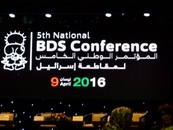
Held on the 68th anniversary of the Deir-Yassin massacre, the fifth annual BDS (Boycott, Divestment, Sanction) Conference took place in Ramallah. The event featured a keynote address from Ahmed Kathrada – an icon of the South African Anti-Apartheid movement and former political prisoner. The conference was taking place in the tenth year of non-violent resistance by the BDS movement.
The day was extremely well attended, in spite of recent statements by Israeli Intelligence Minister Israel Katz, that euphemistically encouraged assassination attempts against BDS Activists by calling for: “civil targeted killings.” This aggressive attitude was demonstrated in Israel’s attempts to deny and/or obstruct travel to the conference for Palestinians living inside the 1948 borders of Israel and from the West Bank in general. This resulted in coaches of attendees from Jerusalem being delayed and some being denied access.
Mr. Kathrada’s keynote address concerned the mirroring of aspects of the struggle against Apartheid in South Africa and the current struggle by Palestinians against the illegal Israeli occupation: “[The Palestinian experience] is similar to the experience of black South Africans under Apartheid. However, in some ways the violence of Israel’s occupation is even worse than that which South Africans had to contend with.”
Mr. Kathrada went on to describe his 26 years and 3 months in prison, 18 years of which were spent on Robben Island. He drew an audible response of sadness and disbelief when comparing his own experience and that of Palestinians, as he observed that he was, “convinced that Palestinian political prisoners under Israel’s Apartheid policies have it worse.”
In addition to the keynote speaker, other speakers at the event were split between between those linking BDS to the “Globalised Nonviolent Struggle for Justice and Rights” and speakers on “Spreading the BDS anti-Normalisation Culture Among Palestinian Communities in the Homeland and Exile”.
Notably at the conference, Dr. Wassel Abu-Yousef, speaking on behalf of the PLO Executive Committee said: “the PLO has taken into consideration the importance of having a relationship with the BDS movement at all levels.” This demonstrates a committment in the wider Palestinian political community to the policy of non-violent resistance as espoused by the BDS movement.
This peaceful commitment stands in contrast, however, to the arguments put forward at the anti-BDS conference in Jerusalem last month, where various pro-Zionist figures put forward their agenda against BDS. That conference included Public Security Minister Gilad Erdan inexplicably linking BDS to jihadism and Islamic terrorism.
Speeches on the day in Ramallah, however, (both live and pre-recorded), far from calling for jihad, were secular, peaceful and informative in their detailing indivdual groups committment to BDS.
Representatives of a wide variety of groups spoke, demonstrating their community’s links to the BDS movement. These included speakers from BDS in Jerusalem and Gaza (the latter prevented from travelling by Israeli blockade and delivering a report via pre-recorded message); those representing Palestinian women’s groups – Women’s Campaign for Boycotting Israeli Products and the General Union of Palestinian Women – political prisoners, media, schools, trade unions and refugees. As well as local campaigners, international groups provided updates on their BDS campaigns from the USA (specifically in relation to progressive American Jews) South America, Egypt and the EU.
The conference concluded with an address by Omar Barghouti – co-founder of BDS – and a conference-wide discussion on the future of the movement.
The day was extremely well attended, in spite of recent statements by Israeli Intelligence Minister Israel Katz, that euphemistically encouraged assassination attempts against BDS Activists by calling for: “civil targeted killings.” This aggressive attitude was demonstrated in Israel’s attempts to deny and/or obstruct travel to the conference for Palestinians living inside the 1948 borders of Israel and from the West Bank in general. This resulted in coaches of attendees from Jerusalem being delayed and some being denied access.
Mr. Kathrada’s keynote address concerned the mirroring of aspects of the struggle against Apartheid in South Africa and the current struggle by Palestinians against the illegal Israeli occupation: “[The Palestinian experience] is similar to the experience of black South Africans under Apartheid. However, in some ways the violence of Israel’s occupation is even worse than that which South Africans had to contend with.”
Mr. Kathrada went on to describe his 26 years and 3 months in prison, 18 years of which were spent on Robben Island. He drew an audible response of sadness and disbelief when comparing his own experience and that of Palestinians, as he observed that he was, “convinced that Palestinian political prisoners under Israel’s Apartheid policies have it worse.”
In addition to the keynote speaker, other speakers at the event were split between between those linking BDS to the “Globalised Nonviolent Struggle for Justice and Rights” and speakers on “Spreading the BDS anti-Normalisation Culture Among Palestinian Communities in the Homeland and Exile”.
Notably at the conference, Dr. Wassel Abu-Yousef, speaking on behalf of the PLO Executive Committee said: “the PLO has taken into consideration the importance of having a relationship with the BDS movement at all levels.” This demonstrates a committment in the wider Palestinian political community to the policy of non-violent resistance as espoused by the BDS movement.
This peaceful commitment stands in contrast, however, to the arguments put forward at the anti-BDS conference in Jerusalem last month, where various pro-Zionist figures put forward their agenda against BDS. That conference included Public Security Minister Gilad Erdan inexplicably linking BDS to jihadism and Islamic terrorism.
Speeches on the day in Ramallah, however, (both live and pre-recorded), far from calling for jihad, were secular, peaceful and informative in their detailing indivdual groups committment to BDS.
Representatives of a wide variety of groups spoke, demonstrating their community’s links to the BDS movement. These included speakers from BDS in Jerusalem and Gaza (the latter prevented from travelling by Israeli blockade and delivering a report via pre-recorded message); those representing Palestinian women’s groups – Women’s Campaign for Boycotting Israeli Products and the General Union of Palestinian Women – political prisoners, media, schools, trade unions and refugees. As well as local campaigners, international groups provided updates on their BDS campaigns from the USA (specifically in relation to progressive American Jews) South America, Egypt and the EU.
The conference concluded with an address by Omar Barghouti – co-founder of BDS – and a conference-wide discussion on the future of the movement.
7 apr 2016

More than 100 prominent writers and literary figures have written a damning open letter to PEN American Center, urging it “to reject support from the Embassy of Israel” for the week-long World Voices Festival (PWVF) in New York at the end of this month.
“It is deeply regrettable that the festival has chosen to accept sponsorship from Israel, even as it intensifies its decades-long denial of basic rights to the Palestinian people, including the frequent targeting of Palestinian writers and journalists,” read the letter sent to PEN American Center and other festival participants in March, which was published online on Wednesday.
According to Press TV/Al Ray, PEN American Center, based in New York, is the largest of the 144 centers that belong to PEN International, the worldwide association of prominent writers and editors that defends those who are harassed, imprisoned and killed for expressing their views.
The letter added that both Palestinian and international journalists and writers face heightened levels of repression by the Tel Aviv regime.
“In 2015, Israel denied Palestinian American novelist Susan Abulhawah entry into Palestine, and African American writer Kristian Davis Bailey was racially profiled, arrested and harassed by Israeli authorities, when he attempted to visit Palestine. All these incidents are part of a broader pattern of Israel’s systematic repression of Palestinian artists and cultural workers as well as the suppression of voices supportive of Palestinian rights,” it pointed out.
Among the writers who have signed onto the letter are Pulitzer Prize winners Alice Walker, Richard Ford and Junot Diaz, plus award-winning author Louise Erdrich.
Former president and vice president of English PEN, Gillian Slovo and Kamila Shamsie, poet Eileen Myles, authors Louise Erdrich and Ahdaf Soueif, and the Palestinian writer Ahmad Qatamesh, whose administrative detention by Israeli authorities was slammed by PEN International, also put their names on the letter.
The letter was sent to PEN American Center by Adalah, a non-profit group that supports the Boycott, Divestment and Sanctions movement against Israel.
“As a PEN member, I want this organization that is supposed to be a champion of writers’ rights to stand up for Palestinian writers, academics and students who are suffering under a repressive Israeli regime that denies their right to freedom of expression,” said American writer Alice Walker, author of the critically-acclaimed novel the Color Purple.
Marilyn Hacker, recipient of PEN Voelcker award for poetry and PEN award for poetry in translation, also stated that “PEN should have policies and ethical standards in place forbidding partnerships with significant human rights abusers. On that basis alone, PEN should rule out a partnership with Israel.”
“It is deeply regrettable that the festival has chosen to accept sponsorship from Israel, even as it intensifies its decades-long denial of basic rights to the Palestinian people, including the frequent targeting of Palestinian writers and journalists,” read the letter sent to PEN American Center and other festival participants in March, which was published online on Wednesday.
According to Press TV/Al Ray, PEN American Center, based in New York, is the largest of the 144 centers that belong to PEN International, the worldwide association of prominent writers and editors that defends those who are harassed, imprisoned and killed for expressing their views.
The letter added that both Palestinian and international journalists and writers face heightened levels of repression by the Tel Aviv regime.
“In 2015, Israel denied Palestinian American novelist Susan Abulhawah entry into Palestine, and African American writer Kristian Davis Bailey was racially profiled, arrested and harassed by Israeli authorities, when he attempted to visit Palestine. All these incidents are part of a broader pattern of Israel’s systematic repression of Palestinian artists and cultural workers as well as the suppression of voices supportive of Palestinian rights,” it pointed out.
Among the writers who have signed onto the letter are Pulitzer Prize winners Alice Walker, Richard Ford and Junot Diaz, plus award-winning author Louise Erdrich.
Former president and vice president of English PEN, Gillian Slovo and Kamila Shamsie, poet Eileen Myles, authors Louise Erdrich and Ahdaf Soueif, and the Palestinian writer Ahmad Qatamesh, whose administrative detention by Israeli authorities was slammed by PEN International, also put their names on the letter.
The letter was sent to PEN American Center by Adalah, a non-profit group that supports the Boycott, Divestment and Sanctions movement against Israel.
“As a PEN member, I want this organization that is supposed to be a champion of writers’ rights to stand up for Palestinian writers, academics and students who are suffering under a repressive Israeli regime that denies their right to freedom of expression,” said American writer Alice Walker, author of the critically-acclaimed novel the Color Purple.
Marilyn Hacker, recipient of PEN Voelcker award for poetry and PEN award for poetry in translation, also stated that “PEN should have policies and ethical standards in place forbidding partnerships with significant human rights abusers. On that basis alone, PEN should rule out a partnership with Israel.”
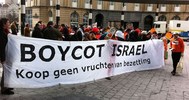
Dozens of pro-Palestine activists boycotted Wednesday the occupied Jerusalem Mayor Nir Barkat’s lecture at San Francisco University in the USA.
The activists managed to enter the hall and to interrupt Barkat’s speech who tried to justify Israeli crimes and violations against Palestinians.
Israeli media sources said that “pro-Palestinian student activists disrupted a speech by Jerusalem Mayor Nir Barkat at the University of San Francisco, carrying pro-Palestinian flags, wearing checkered kaffiyehs and raising their fists as they shouted Intifada.”
They also chanted a popular pro-Palestinian cheer: “From the river to the sea, Palestine will be free.” Police and security guards were called to protect the Israeli official.
The activists managed to enter the hall and to interrupt Barkat’s speech who tried to justify Israeli crimes and violations against Palestinians.
Israeli media sources said that “pro-Palestinian student activists disrupted a speech by Jerusalem Mayor Nir Barkat at the University of San Francisco, carrying pro-Palestinian flags, wearing checkered kaffiyehs and raising their fists as they shouted Intifada.”
They also chanted a popular pro-Palestinian cheer: “From the river to the sea, Palestine will be free.” Police and security guards were called to protect the Israeli official.
3 apr 2016

The Boycott, Divestment and Sanctions (BDS) Movement has achieved another success after it managed to convince organizers of the Seoul Human Rights Film Festival to reject the participation of an Israeli film in the event.
Organizers of the festival sent a message to the producer of the Israeli film, "Third Person," affirming that it canceled the participation of the film and would send back the registration fee.
"We have met with Palestinian activists and BDS activists and we discussed the participation of your film in the Seoul Human Rights Film Festival, which is an organization active in the field of human rights," the message read.
"The topic of the film is very important, but we are working with anti-war organizations and thus we have decided to adopt the viewpoint of BDS," it added. Third Person is a film produced by an Israeli channel and about people who are intersex and living in Israel.
Organizers of the festival sent a message to the producer of the Israeli film, "Third Person," affirming that it canceled the participation of the film and would send back the registration fee.
"We have met with Palestinian activists and BDS activists and we discussed the participation of your film in the Seoul Human Rights Film Festival, which is an organization active in the field of human rights," the message read.
"The topic of the film is very important, but we are working with anti-war organizations and thus we have decided to adopt the viewpoint of BDS," it added. Third Person is a film produced by an Israeli channel and about people who are intersex and living in Israel.
29 mar 2016
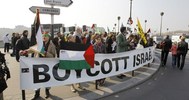
Palestinian National Committee of the Boycott, Divestment and Sanctions (BDS) Movement against Israel condemned the normalization of commercial relations practiced by the Palestinian businessman Hani al-Alami with Israeli figures.
Alami is participating in the Forbes Economic Conference, which is to be held on the third of April in Tel Aviv and Occupied Jerusalem.
The committee stressed, in a statement, that it is not the first time that Alami participates in normalization projects with Israel.
The committee demanded him to cancel his participation in such meetings that constitute a cover for Israeli crimes against Palestinians.
Alami is participating in the Forbes Economic Conference, which is to be held on the third of April in Tel Aviv and Occupied Jerusalem.
The committee stressed, in a statement, that it is not the first time that Alami participates in normalization projects with Israel.
The committee demanded him to cancel his participation in such meetings that constitute a cover for Israeli crimes against Palestinians.
